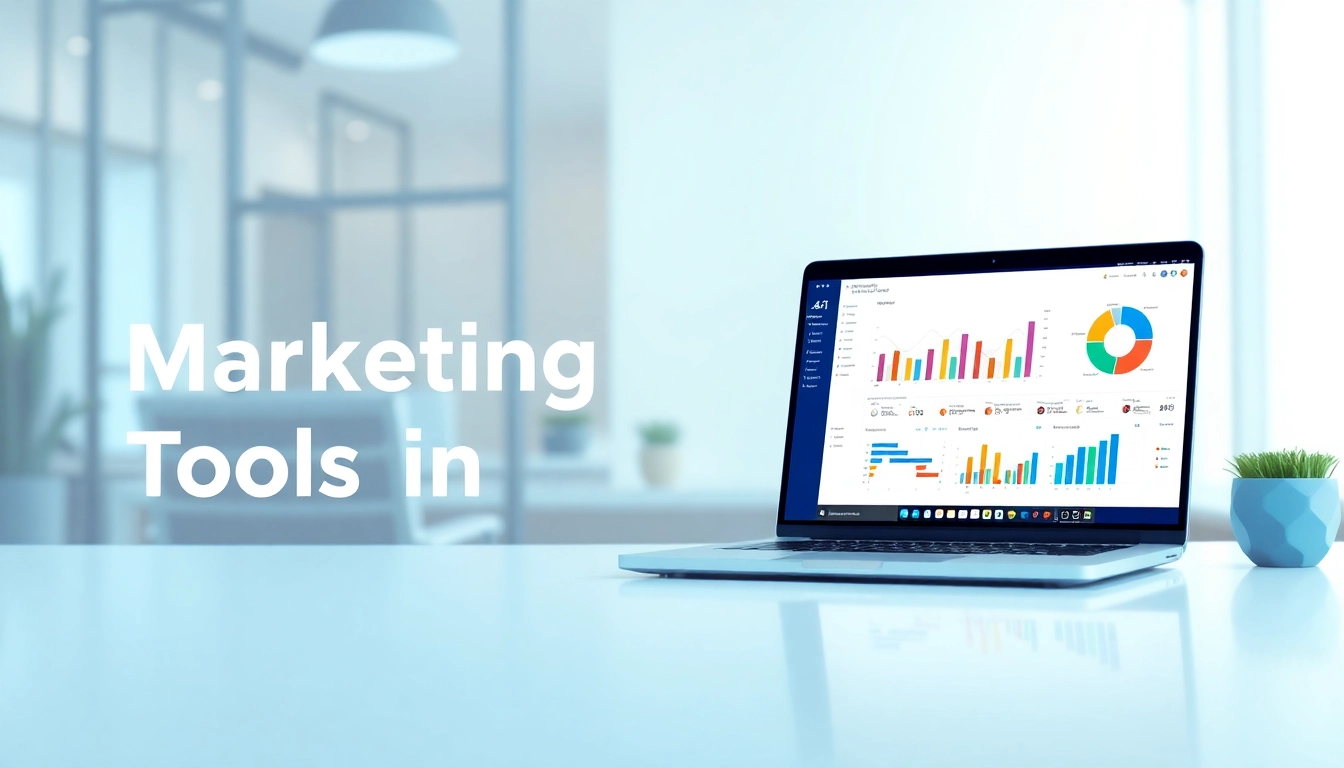Introduction to AI Marketing Tools
As we navigate the rapidly evolving landscape of digital marketing, businesses are increasingly turning to AI marketing tools for a competitive edge. These innovative solutions leverage artificial intelligence to streamline workflows, enhance customer engagement, and drive overall marketing effectiveness. The integration of AI in marketing not only automates mundane tasks but also provides data-driven insights that can transform marketing strategies. This article will explore the key aspects of AI marketing tools, their benefits, the latest trends for 2025, and offer guidance on selecting and maximizing the right tools for your business.
What are AI Marketing Tools?
AI marketing tools are software applications that utilize artificial intelligence technologies to assist marketers in various activities, including data analysis, content creation, customer segmentation, and campaign optimization. These tools can range from simple automated systems to complex machine learning algorithms capable of predicting customer behavior and personalizing user experiences.
Why Businesses Need AI Marketing Tools
In today’s digital marketing environment, consumer expectations are higher than ever. Businesses are continuously seeking ways to enhance their operational efficiency and customer satisfaction. Here are several reasons why AI marketing tools have become essential:
- Enhanced Decision Making: AI tools analyze vast amounts of data to provide insights that inform marketing strategies and campaigns.
- Increased Efficiency: Automating repetitive tasks allows marketing teams to focus on strategic initiatives and creative problem-solving.
- Data-Driven Strategies: AI tools enable businesses to utilize real-time data to make informed decisions and tailor campaigns to specific audiences.
- Improved Customer Experience: Through personalization and targeted communication, AI can enhance how brands interact with their customers.
Overview of AI Marketing Trends for 2025
As we look to 2025, several trends are emerging within the realm of AI marketing tools that businesses should be aware of:
- Increased Personalization: AI will continue to refine targeting and create hyper-personalized experiences tailored to individual consumer preferences.
- Predictive Analytics: Businesses will harness predictive analytics to anticipate customer behavior, enabling proactive engagement and strategic decision-making.
- Voice and Conversational Marketing: With the rise of voice search and smart speakers, marketers will increasingly focus on optimizing content for voice-activated queries.
- Integration of AI in Ad Campaigns: AI-powered tools will optimize ad spending through real-time analysis and campaign management.
Categories of AI Marketing Tools
To effectively harness the power of AI in marketing, businesses can leverage different categories of AI marketing tools, each designed to address specific challenges:
Content Creation and Automation Tools
Content remains king in the digital landscape, and AI tools are transforming how marketers create and distribute content. These tools automate the content creation process, helping marketers generate high-quality articles, social media posts, and marketing emails efficiently. Notable examples include:
- Jasper: This AI content generation tool assists in crafting engaging blog posts and marketing copy tailored to specific audiences.
- Copy.ai: With its intuitive interface, Copy.ai creates compelling copy for various marketing purposes, reducing the time spent on content writing.
- Canva: Though primarily a design tool, Canva’s AI features help users create visually appealing graphics and layouts effortlessly.
Customer Engagement and Personalization Tools
Engaging customers effectively is critical to any marketing strategy. AI-driven customer engagement tools help businesses personalize communication and enhance customer interactions. Tools such as:
- HubSpot: HubSpot’s CRM utilizes AI to provide insights into customer behavior and optimize marketing efforts accordingly.
- Drift: Drift’s AI chatbot solution enhances real-time customer interactions, providing instant support and personalized recommendations.
- Adaptive Marketing Platforms: These platforms leverage AI to automate targeting and segmentation, delivering personalized content to the right audience at the right time.
Data Analysis and Reporting Tools
Understanding data is paramount for any successful marketing strategy. AI-powered data analysis tools provide marketers with real-time insights and analytics, enabling them to make informed decisions. Popular options include:
- Google Analytics: With AI enhancements, Google Analytics provides deep insights into user demographics, behavior, and engagement metrics.
- Tableau: This data visualization tool employs AI to uncover trends and patterns within data, helping marketers interpret complex data sets easily.
- Mixpanel: Focused on product analytics, Mixpanel utilizes AI to track user interactions with applications, delivering insights on conversion rates and user engagement.
Choosing the Right AI Marketing Tools for Your Business
With countless options available, selecting the right AI marketing tools can be daunting. Here are key factors to consider during the selection process:
Assessing Business Needs and Goals
Before investing in AI marketing tools, it’s crucial to assess your business needs. Are you looking to improve customer engagement, streamline content creation, or enhance data analytics? Establishing clear goals will guide your selection. Take into account:
- Your target audience and how AI tools can improve engagement with that audience.
- The specific marketing channels you utilize and how these tools can optimize each channel.
Evaluating Tool Features and Pricing
Different AI marketing tools offer various features at different price points. When evaluating options, consider:
- The key features that will deliver the most value for your marketing strategy.
- How pricing aligns with your budget and whether subscription models fit into your overall business strategy.
- Customer support and training—are these resources available for onboarding your team effectively?
Using Free Trials and Demos Effectively
Many AI marketing tools offer free trials. Utilizing these trials can provide valuable insights. Here’s how to make the most of them:
- Set clear objectives for what you want to achieve during the trial period.
- Involve team members who will use the tools to gather their feedback and ensure user-friendliness.
- Assess the tool’s impact on your workflows and whether it integrates well with your existing systems.
Maximizing ROI from AI Marketing Tools
Investing in AI marketing tools represents significant potential upside, but it’s crucial to maximize this investment for optimal results. Here are strategies to ensure you achieve the best ROI:
Setting Clear KPIs and Metrics
To measure the success of your AI marketing tools, establish clear Key Performance Indicators (KPIs) that align with your business objectives. Some KPIs include:
- Conversion rates: Measure how many leads turn into customers after implementing AI tools.
- Engagement rates: Assess how AI tools impact customer interaction with content and marketing assets.
- Customer retention metrics: Analyze whether personalized engagement improves customer loyalty and repeat purchases.
Integrating AI Tools with Existing Workflows
Effective integration of AI marketing tools into existing workflows can enhance organizational efficiency. To achieve this:
- Identify overlapping processes and determine how AI can complement these workflows.
- Provide training for users to familiarize them with the new tools and processes.
- Encourage ongoing collaboration among teams to share insights and best practices related to tool usage.
Continuous Learning and Improvement Strategies
The marketing landscape is dynamic, and AI tools evolve continuously. To stay ahead:
- Engage in regular training and workshops to keep your team updated on the latest features and functionalities.
- Monitor industry developments to identify emerging trends and best practices related to AI marketing tools.
- Utilize data-driven insights from your AI tools to iterate on strategies and optimize campaigns continually.
Future of AI in Marketing
As AI technology continues to advance, its role in marketing is expected to expand significantly. Understanding these changes can help businesses prepare for the future:
Emerging Technologies and Innovations
The next wave of AI will likely include advancements in natural language processing (NLP), advanced machine learning algorithms, and enhanced personalization capabilities. Innovations such as:
- AI-Driven Content curation: Future AI tools may offer more sophisticated content curation that anticipates user needs based on contextual data.
- Augmented Reality Marketing: The integration of AI with augmented reality (AR) can create immersive and interactive customer experiences.
Predictions for the Next Five Years
Experts predict that by 2025, the adoption of AI in marketing will be the norm rather than the exception. Key predictions include:
- Increased reliance on AI for real-time marketing decisions.
- Greater emphasis on data privacy and ethical AI deployment.
- Skills in AI and data analysis becoming essential for marketers.
Final Thoughts and Best Practices
Navigating the world of AI marketing tools can seem overwhelming, but with thoughtful assessment and implementation, businesses can reap substantial benefits. Embrace AI not just as a tool, but as a partner in understanding and engaging with your customers. As we move into the future, staying informed, adaptable, and data-driven will be essential in harnessing the full potential of AI marketing tools.



